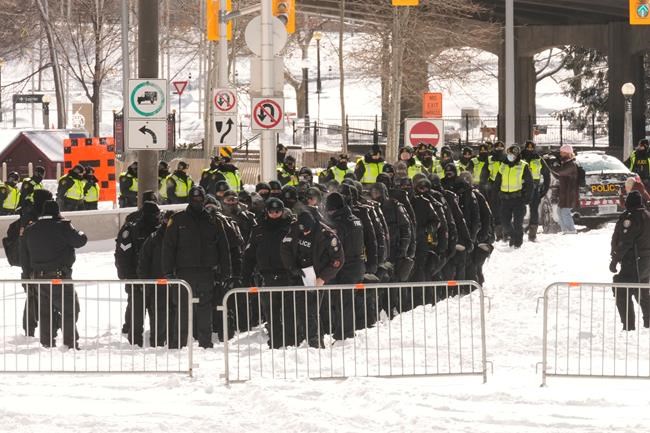In a bid to end a three-week occupation that has rippled across Canada and around the world, police officers pounced on anti-government protestors in Ottawa on Friday, detaining at least 100 individuals and towing more than 20 vehicles.
Following an overnight snowstorm, dozens of officers positioned in the very cold downtown core began moving mid-morning under a brilliant sun, forcing demonstrators back and making arrests along the way.
Lines of police slowly approached on a crossroads immediately east of Parliament Hill, surrounded by policemen on horseback and on roofs, isolating one set of demonstrators.
Police blasted warnings over a loudspeaker before officers advanced intermittently, forcing back dozens of demonstrators, some of whom linked arms or laid down in resistance while others hurled insults or tried to flee.
Officers in military green, some with gas masks and what appeared to be tear-gas guns, converged on the protesters from another direction in an apparent pincer movement before a third group of police boxed them in.
As officers closed on that group, other protesters watched from their main camp further west on Wellington Street near the National War Memorial and Parliament Hill, urging their embattled comrades to “hold the line” and hurling their own invective.
By evening, the situation grew more heated. A group of mounted police suddenly charged a large group of protesters facing police lines near the Senate in an apparent effort to move the crowd up toward Wellington Street. Many in the shocked crowd ran, some yelling, “You are trampling us!”
Ottawa police said on Twitter that protesters had continued “assaultive behaviour” with the police line and to prevent an escalation or further injury, mounted officers were sent in to create a safe distance between officers and protesters.
As this was happening, police said, a bicycle was thrown at the feet of one of the horses in an attempt to injure it. One person was arrested for allegedly intentionally harming a police service animal.
“Protesters are assaulting officers, have attempted to remove officers’ weapons. All means of de-escalation have been used to move forward in our goal of returning Ottawa to its normalcy,” the police service tweeted.
The police action, which included the RCMP, Ontario Provincial Police, local officers and units from other cities, followed an initial round of arrests Thursday against key organizers.
It also came after repeated warnings and signals in the past two days that police were preparing for a crackdown following weeks of accommodating the demonstration, which had left many Ottawa residents angry, frazzled and critical of the city’s police force.
Ottawa police interim chief Steve Bell told a news conference Friday that clearing the area will take time, but the operation is “deliberate and methodical” and police are in control on the ground.
Those arrested have been charged with various offences including mischief, he said, adding police are still urging demonstrators to leave peacefully.
He said there has been no need to interact with the Children’s Aid Society of Ottawa, but it still “shocks and surprises” him that children are being put in harm’s way in the middle of a demonstration where a police operation was unfolding.
“We will continue to look after their safety and security. But we implore all the parents who have kids in there – get kids out of there,” Bell said. “They do not need to be in the middle of this. It is not a safe place for them.”
Ottawa police have accused some protesters of putting children between themselves and advancing officers. The allegation was not independently verified.
As police pushed back the protesters, tow trucks moved in to remove some of the dozens of big rigs and other vehicles that have been used to essentially blockade the streets around Parliament Hill since late last month.
Police were also staffing dozens of checkpoints around the downtown core designed to prevent any new protesters from arriving to reinforce those inside the perimeter.
Rows of officers moved in on truckers who were parked at a major intersection near the Parliament buildings, where those inside such as Dale Sherstobitoff were ordered out of their cabs and onto the street.
“I’m embarrassed of our prime minister. I’m embarrassed of these cops,” she said. “This shouldn’t be happening in Canada.”
While some protesters on the outer edges of the downtown protest were starting to pack their bags and rolling suitcases into the back of their pickups ahead of leaving, others said they were unperturbed by the threat of arrest and planned to stay.
Some continued to gather in the street in front of Parliament Hill, delivering speeches from a makeshift stage.
Yet even as some were digging in, key organizers and figures within the protest such as Pat King were bowing out.
King initially urged demonstrators to walk to Parliament Hill and jackknife rigs in front of tow trucks to prevent them from moving vehicles. But he later reversed course, telling protesters on a Facebook livestream to retreat from downtown Ottawa and regroup at a nearby truck stop.
He later posted a video of police arresting him in his vehicle.
Two other protest organizers – Chris Barber and Tamara Lich – were arrested Thursday. Barber has also been charged with counselling to disobey a court order and to obstruct police.
A judge with the Ontario Court of Justice granted bail to Barber. Justice Julie Bourgeois released him on a $100,000 bond and on the conditions he leave Ontario by Feb. 23, not publicly endorse the convoy or have any contact with the other major protest organizers. Lich is to appear in Ottawa courtroom on Saturday morning and was to spend the night in jail awaiting her bail hearing.
King, Lich and other organizers of the so-called Freedom 2022 protests also saw a temporary freeze to their bank accounts – including Bitcoin and cryptocurrency funds – following an Ontario Superior Court ruling on Thursday.
In addition, a class-action lawsuit on behalf of thousands of downtown Ottawa residents seeks millions of dollars in damages for the noise and serious disruptions caused by the protest.
Some protesters have said they came to Ottawa simply to demand that COVID-19 measures be lifted. But others, including those who claim to be leading the convoy, have demanded the Liberal government be ousted.
The protest in Ottawa quickly spread to other parts of the country, disrupting business and trade amid concerns far-right extremists and hate groups were trying to use the demonstrations to advance their ideological agendas.
Police started to clear the protesters in southern Ontario, Alberta and elsewhere earlier this week. The Ottawa force’s chief resigned Wednesday amid intense criticism over the state of lawlessness downtown.
While police were clearing the streets outside, members of Parliament were forced to cool their heels on a divisive debate around the Liberal government’s decision this week to invoke the Emergencies Act in response to the protests.
Late Friday, Government House leader Mark Holland said the House of Commons will resume debate Saturday on the use of the Emergencies Act to respond to the illegal blockades.
Earlier in the day the Speaker and House leaders from all parties agreed to cancel Friday’s sitting on the advice of parliamentary security.
Holland said on Twitter that the safety of MPs and all employees on Parliament Hill is paramount.
The House began debating the government’s decision to invoke the Emergencies Act on Thursday.
Holland said the pause would not affect the outcome and MPs who want to speak will do so. He said MPs will vote early next week on the Emergencies Act motion.
The new powers include the potential to freeze protesters’ bank accounts and prohibit people from gathering in certain locations or participating in actions that threaten trade, essential infrastructure, individuals, or property.

Bringing children within 500 meters of the blockades is now prohibited, as is providing supplies or property to participants.
The Canadian Civil Liberties Association, for example, is challenging the regulations in court. They are expected to pass in the House of Commons, with the Liberals and NDP supporting them and the Conservatives and Bloc Quebecois opposing them.
Source_ globalnews.ca











